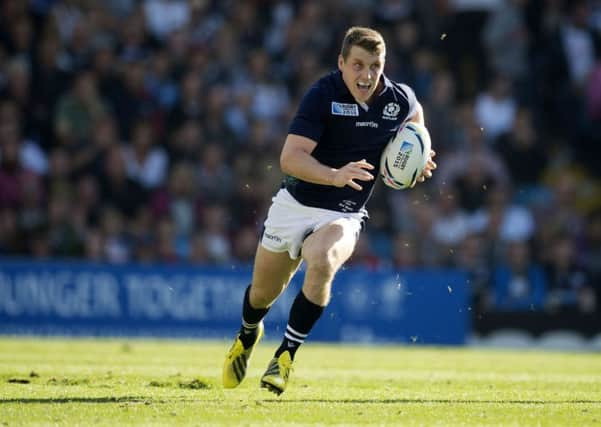Mark Bennett leads list of Scotland Six Nations injury woes


Last year’s global event in England was a magnificent success, arguably the biggest and best ever, but such is the history and tradition of the oldest international tournament that there is no “after the Lord Mayor’s Show” feel going into what should be a fascinating few months.
The dominance of the southern hemisphere nations as they took all four semi-final spots was an undoubted blow to northern prestige but it will be back to La Cosa Nostra when ancient rivalries resume on 6 February.
Advertisement
Hide AdAdvertisement
Hide AdThere may not be the quality of the All Blacks or Wallabies or indeed the superior physicality of the Springboks and even the Pumas, but the compact and intense nature of the Six Nations makes it a different kind of test than that of last autumn. It is similar to the way football’s European Championship was often considered a more demanding examination than a World Cup – until it was expanded that is, as it now seems every country in the continent gets to the finals except for Scotland.
When Cotter made his comparison it was more to do with the time he got with the players. Last year the national squad was together longer than many a Hollywood marriage and it showed on the park as a well conditioned and organised unit belied their Six Nations Wooden Spooners’ tag in reaching that unforgettable quarter-final against Australia. Due to a combination of good fortune, meticulous preparation and a highly-skilled medical staff, Scotland enjoyed a remarkably light casualty load compared to other nations and were the northern hemisphere team to take the most out of that World Cup. Hosts England had a well-documented nightmare, Six Nations champions Ireland lurched from dark horses to lame nags, injury-ravaged Wales ran out of steam, France were humiliated by the All Blacks and Italy, well they turned up and that’s about as much as you can say.
However, time never stands still in sport and, while the feelgood factor of Scotland’s recent performances continues to fuel optimism, there is also a sense that it will be a fresh start from scratch when Eddie Jones’s England pitch up for the Calcutta Cup showdown at BT Murrayfield a fortnight on Saturday.
Unlike the World Cup, which included a three-month build-up of training combined with warm-up matches, the Six Nations arrives in the middle of a gruelling season which has already taken its toll.
The “Glasgow bounce” was talked about last summer too as the large contingent of Warriors players bounded into the Test arena fresh from their Guinness Pro12 title heroics and brimming with confidence. After their recent 1872 Cup and European disappointments there is understandably likely to be significantly less spring in their step at present. One of the main injury worries that Cotter faces is Glasgow centre Mark Bennett, who was one of the stand-out performers at the World Cup. He received an assessment on his shoulder from a specialist yesterday and we will know today where his chances stand.
With fellow centres Peter Horne and Richie Vernon also on the casualty list, the return of Alex Dunbar is a timely one, while Duncan Taylor, who missed the World Cup with a shoulder injury, has been starting for Saracens.
Of other “Anglos” in contention, Ruaridh Jackson has been featuring for Wasps and has a chance, while Harlequins wing Tim Visser is expected to be recovered from his hamstring injury by the middle of next month.
Skipper and world player of the year nominee Greig Laidlaw is now the undisputed No 1 choice scrum-half ahead of Sam Hidalgo-Clyne, with Ali Price probably doing enough of late to gain the third spot in the absence of the injured Henry Pyrgos.
Advertisement
Hide AdAdvertisement
Hide AdThe clouds over Ryan Wilson and Tim Swinson, who were both cited by European authorities last night for alleged testicle grabbing and punching respectively in Sunday’s loss at Northampton, could complicate matters up front.
The Edinburgh front row of Al Dickinson, Ross Ford and WP Nel have developed into the rock upon which Cotter’s castle is built and the first two of those are currently out. However, Dickinson is expected to have recovered from his calf strain this week and the 94-times capped hooker’s rib problem does not appear to be considered too serious.
Fraser Brown is currently sidelined with an ankle problem but Stuart McInally is back for Edinburgh and, while in need of match practice, provides cover at hooker.
There could be front-row berths for two youngsters, in the shape of Edinburgh’s Rory Sutherland and Glasgow’s Zander Fagerson. Exeter’s Moray Low could also return.
In the back row, John Hardie, Blair Cowan, David Denton and Josh Strauss are all assumed to be certainties, while, after being unlucky to miss out on the World Cup squad, John Barclay could return to the fold. Fit-again Hamish Watson of Edinburgh and Glasgow counterpart Chris Fusaro will also have hopes of forcing their way in.